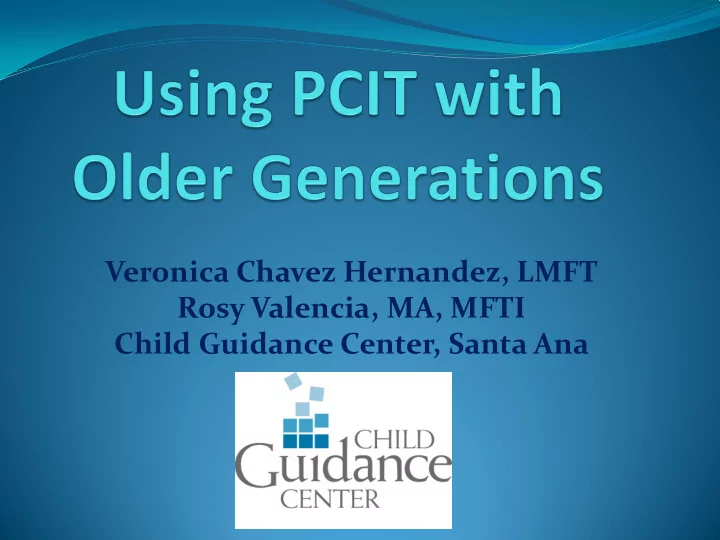

Veronica Chavez Hernandez, LMFT Rosy Valencia, MA, MFTI Child Guidance Center, Santa Ana
Presentation Objectives: Information/statistics on older generation caring for grandchildren Discussing older generation guardians/caretakers in PCIT with respect to challenges using this modality including age and cultural factors. Present challenges/considerations using PCIT with older generation Spanish-speaking caretakers
United States Statistics: U.S Consensus 2012
California Statistics: U.S Bureau of Consensus 2002
U.S Census 2012
California Statistics: U.S Bureau of Census 2012
Importance of Older Generation caretakers
Generational/Age Factors: PCIT concepts are new to them and unlike what they experienced during their own childhood Concepts can take longer to understand and apply Difficulty taking directives/direction from a PCIT clinician who is younger than they are Caretaker may not be fully committed as they believe the parent(s) will resume the parental role
Generational/Age Factors continued Underlying/Additional stressors that come with being a caretaker at a later age Difficulty adapting to the way new generation is being raised Challenged with modifying old habits, techniques, and skills that they used when raising their own children Literacy issues
Cultural Factors: P.R.I.D.E skills do not directly translate into terms they are comfortable or used to Primary language of child and caretaker may not be similar Roles are blurred with respect to being a grandparent/older caretaker versus parent Stigma in general about being in therapy and especially with a treatment modality where they are directly responsible for working on skills/techniques/parenting Difficulty with accepting therapy/PCIT as a proper way to discipline or connect with children
Older Generation Perceptions about Discipline:
Frequent Questions/Comments from Older Caretakers Why should I praise a behavior that is expected of the child? Why do I need to come here if I already know how to parent? This is not the way I was raised. In my country we do things differently. How is therapy going to work and how will it help?
Suggestions applying PCIT principles with Older Generations: Collaborating on vocabulary that is comfortable, easier to remember and apply while maintaining PCIT skill Checking in to address relevant issues/concerns outside of PCIT Psychoeducation about efficacy of skills and how they are relevant to current generation Accepting that it may take longer for them to meet mastery or if ever attain it Dealing and providing support for comments or criticisms from family members when there is little improvement with child’s behaviors
for your interest in this topic!
Recommend
More recommend